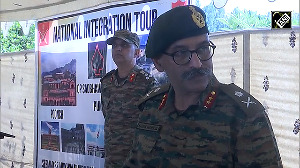The campaign in Tamil Nadu for the elections to the Lok Sabha, which ended on May 11, saw copious shedding of crocodile tears not only for the plight of the Sri Lankan Tamils, but also for the cause of a separate Tamil homeland as the Dravida Munnetra Kazhagam of M Karunanidhi put it or for the cause of an independent Tamil Eelam as the All India Anna Dravida Munnetra Kazhagam of J Jayalalithaa and other Tamil parties put it.
Of the various parties contesting the elections, only the Bharatiya Janata Party, the Congress and the Communist Party of India, which are national and not regional parties, made a distinction between support for the plight of the Tamils and support for the cause of Tamil Eelam. They desisted from supporting the latter.
There has been a certain hypocrisy in the stand of both the DMK and the AIADMK. The DMK, which in the past had made no secret of its sympathies for the Liberation Tigers of Tamil Eelam and its leader V Prabhakaran, had at the same time refrained from supporting the demand for a Tamil Eelam. It had always given the impression of supporting the stand of the government of India of canvassing for the political and economic rights of the Tamils in a unified, but not unitary Sri Lanka.
The AIADMK had in the past strongly opposed the LTTE and Prabhakaran as well as their demand for an independent Tamil Eelam. Jayalalithaa's abrupt volte face on this subject during the course of the election campaign and her coming out in support of the totally unwise suggestion for sending the Indian Army to the Tamil areas of Sri Lanka for facilitating the creation of an independent Tamil Eelam came as a total surprise. Taken aback by the change in her stand, Karunanidhi, who has shown a lack of consistency and lucidity on the Tamil issue for over a year now, came out with his own support for a Tamil homeland without explaining what he meant.
The Sri Lankan Tamils already have a homeland in the northern and eastern provinces of Sri Lanka. The question is what should be the constitutional status of this homeland. Should it become an independent Tamil Eelam as demanded by the LTTE or should it become a largely autonomous state of a federal Sri Lanka as demanded by other Sri Lankan Tamil parties and as supported by the government of India since the days of Rajiv Gandhi as the prime minister?
How can Jayalalithaa and Karunanidhi come out in support of an independent Tamil Eelam or a homeland for the Tamils when none of the Tamil political parties in Sri Lanka except the LTTE has supported such a demand? Even the LTTE is now a party in its death rattle. The knee-jerk reactions on the Sri Lankan Tamil issue among the regional parties of Tamil Nadu and their vying with one another in showing whose heart bleeds more for the Sri Lankan Tamils and their cause show a calculation by all these parties that in the absence of any other major political issue of interest to the nation in general and to Tamil Nadu in particular during the just-ending election campaign the exploitation of the Sri Lankan Tamil issue might provide the magic wand to electrify the voters and get their support.
Whether their calculation proves right or wrong, only the results will show on May 16. But one has to note that outside the screeching headlines of the Tamil media, one has not seen any major outpouring of public support for any of the Tamil parties on the Eelam issue.
One gets an impression that the Tamils of Tamil Nadu are more concerned about their own plight than over the plight of the Sri Lankan Tamils -- caused by the rotten state of the infrastructure, frequent electricity shut-downs under the pretext of maintenance pauses, an administration which activates itself only a few weeks before the elections and then forgets the voters for four years, the political dynasty syndrome and a group of DMK ministers in the cabinet of Dr Manmohan Singh who conducted themselves for four years as if India is Tamil Nadu and Tamil Nadu is India and as if Tamil Nadu is DMK and DMK is Tamil Nadu. The DMK ministers held very important portfolios in New Delhi, but how many non-Tamil citizens of India had heard of them or seen them?
There are three aspects to the Sri Lankan Tamil issue:
a. The humanitarian plight of the Sri Lankan Tamil civilians in the northern and eastern provinces due to the ruthless use of air strikes by the Sri Lankan Air Force in the Tamil areas for the last three years and the use of multi-barrel rockets and artillery pieces given by Pakistan and due to the recent brutal use of the Tamil civilians by the LTTE as human shields in order to ward off its final collapse and maintain its political relevance after having lost its military capabilities.
The Manmohan Singh government and all political parties -- national or regional -- failed deplorably all these months to condemn the use of air strikes and heavy artillery of Pakistani-make against Tamil civilians. The humanitarian problem did not start yesterday. It started three years ago when the Sri Lankan Armed Forces brought their aircraft and Pakistani-origin artillery into action, but not a single political party in India thought it fit to condemn it. They have suddenly become aware of the humanitarian plight of the Tamils a few weeks before the elections. If this is not hypocrisy and political opportunism, what then is it?
b. The cause of the Sri Lankan Tamils, who have always been the objective allies of India. The Sri Lankan Tamil cause, which has the support of all Tamil parties in Sri Lanka, relates to a modification of the present unitary state of Sri Lanka in order to make it a genuine federal state in which the equal rights and dignity of the Tamils in the federal state are guaranteed. This cause had enjoyed the active support of Rajiv Gandhi when he was prime minister. Many Tamils in Tamil Nadu, including this writer, had a legitimate grievance that as prime minister, Manmohan Singh deviated from the traditional policy of Congress and failed to articulate energetically the government of India's support for this. His silence and ambivalent comments -- if at all when he made some rare comments on the Sri Lankan Tamil issue -- were interpreted by the government of President Mahinda Rajapaksa and the Sinhalese extremists in the Sri Lankan Armed Forces as indicating that the government of India no longer supported the Tamil cause as strongly as it did under Rajiv Gandhi and that it could ride rough-shod over the rights of the Tamils without having to worry about any adverse reactions from New Delhi.
c. The cause of an independent Tamil Eelam. The LTTE is the only Tamil organisation in Sri Lanka which supports it. Other Tamil parties don't. Under Indira Gandhi, the Congress gave the impression of supporting it, but Rajiv Gandhi wisely removed this impression and came out against an independent Tamil Eelam and in favour of a federal Sri Lanka with the Tamils enjoying equal rights with the Sinhalese. After the expected death of the LTTE, this would have been a dead issue in Sri Lanka, but attempts are being made in Tamil Nadu to give a fresh lease of life to this issue purely out of electoral calculations and not out of any genuine interest in the future of the Sri Lankan Tamils.
Despite all that has happened till now, India still has many friends in Sri Lanka -- among the Sinhalese as well as the Tamils. There are many on both sides of the political spectrum in Sri Lanka who understand and do not misinterpret India's interest in the future of the Tamils in view of the likely impact of the Sri Lankan Tamil problem on the Indian Tamils in Tamil Nadu. Based on this, the Manmohan Sigh government could have worked out a comprehensive strategy for the future which would have convinced the Sri Lankan Tamils that India continued to care for them and would have, at the same time, reassured the Sinhalese that India did not wish ill of them and Sri Lanka.
The Manmohan Singh government failed to work out such a strategy. Nobody knows what exactly his strategy on Sri Lanka is.





